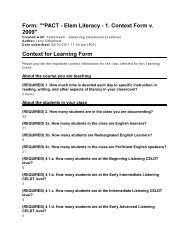The Tutoring Book - California State University, Sacramento
The Tutoring Book - California State University, Sacramento
The Tutoring Book - California State University, Sacramento
Create successful ePaper yourself
Turn your PDF publications into a flip-book with our unique Google optimized e-Paper software.
Situated Acts of Writing and <strong>Tutoring</strong><br />
151<br />
Heather Sula<br />
Fall 2009<br />
At this point in the semester, you’ve probably met with several different student writers and,<br />
furthermore, you may have found it useful to adapt your tutoring methods to meet the various needs of<br />
each particular student. For example, you may have played the uninformed reader to a student in a<br />
different major, asking largely content-related questions, or you may have taken a more directive<br />
approach regarding subject-verb agreement issues with an ESL student. You have probably even changed<br />
your style in different sessions with a recurring tutee, depending on which stage of the writing process<br />
they are engaged in – if it is a brainstorming session, perhaps you’re more likely to just let the writer talk<br />
through his or her ideas, occasionally asking problem-posing questions, or if a draft has organizational<br />
issues, you might make more concrete suggestions as to what might ensure clarity. Just as we adapt our<br />
tutoring style to the needs of the student at hand, I think that it can be beneficial to view writing in a<br />
similar way: as an act of adaptation to a particular rhetorical context. With that in mind, we can also view<br />
tutoring as an opportunity to help students recognize, question, and negotiate these contexts.<br />
A way to facilitate this discussion is through the lens of the postmodern conception of writing as<br />
“situated.” Many scholars have discussed this concept, but I think that Lee-Ann Kastman Breuch, in her<br />
article on post-process pedagogy, sums up the discussion nicely when she says that “writing must<br />
correspond to specific contexts that naturally vary” (115). In the case of writing, a context is the<br />
rhetorical situation that the writer is working within (or, in some cases, around or against), which includes<br />
but is not limited to: tone, audience, form, language use, and so on. While these issues themselves should<br />
always be considered while writing, the specifics of what they are will always change from writing task to<br />
writing task, from context to context. For instance, in a personal narrative, the tone might be somewhat<br />
casual and personable and the form may follow that of a traditional plot with a climax and denouement,<br />
while a sociology essay might require a more formal tone and a decidedly thesis-based form. <strong>The</strong>re is no<br />
one universal rule in writing. <strong>The</strong> “rules,” like language itself, are arbitrary, socially constructed,<br />
contextually-bound, and changeable. This broad view of writing is known as “situatedness,” and it<br />
“refers to the ability to respond to specific situations rather than rely on foundational principles or rules”<br />
(115). Writing is not a matter of knowing how to do it “right,” but of determining what is appropriate for<br />
the situation.<br />
As tutors, we can help writers navigate the tricky terrain of situatedness by allowing our own<br />
experiences and knowledge of writing in various contexts to inform, and, conversely, we can allow<br />
ourselves to be informed by our tutees. An example of this is a simple knowledge exchange. If you<br />
happen to be a literature major and are very good a integrating quotes, you might be able to give your<br />
tutee some ideas of when that might be considered appropriate or how it might stylistically be attempted.<br />
Or if your tutee brings knowledge of the way data is often presented in a scientific research paper, he or<br />
she can break that down for you, which serves the dual purpose of adding to your own general knowledge<br />
and reaffirming their own knowledge and expertise. Any new, context-specific knowledge of this sort<br />
adds to a writer’s knowledge of writing in its various forms, and gives a writer a broader knowledge of<br />
writing as a whole. This aggregation of knowledge hopefully makes it easier for a writer to shift fluidly<br />
between disparate rhetorical contexts.<br />
Another skill tutors can bring to this process of discovery is the knowledge of what kinds of<br />
questions to ask. And usually, the questions that are deceptively simply will yield the most complex, yet

















